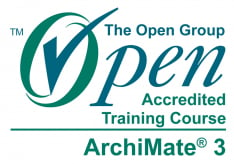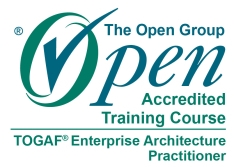ArchiMate® 3 Training Course Outline
Module 1: Basic Concepts and Definitions
- Introduction to ArchiMate® Language
- ArchiMate® Language for Enterprise Architecture Modelling
- What is Enterprise Architecture?
- Key Enterprise Architecture Concepts
- Stakeholders and Concerns
- Development of Enterprise Architectures
- Example ArchiMate® Model
Module 2: Language Structure
- Top-Level Hierarchy of ArchiMate® Concepts
- Layering of ArchiMate® Language
- Definition: ArchiMate® Core Language
- ArchiMate® Core Framework
- Abstract in ArchiMate® Language
- External Vs Internal
- Types Vs Instances
- Behavior Vs Active Structure
- Concepts and their Notation
- Conceptual Vs Logical Vs Physical
- Types Vs Instances
- Use of Nesting
- Use of Colors and Notational Cues
Module 3: Generic Metamodel
- Design Approach
- Metamodels at Different Levels of Specificity
- Design and Core Concepts
- Hierarchy of Behavior and Structure Elements
- Behavior and Structure Elements Metamodel
- Behavior Elements Notation
- Aspects
- Additional Behavior Element Type: Event
- Passive Structure Elements
- Active Structure Elements Notation
- Summary of Specialization of Core Elements
- Specialisations of Structure and Behavior Elements
- Motivation and Composite Elements
- Grouping
- Location
Module 4: Modelling Relationships
- Relationships
- Structural Relationships
- Dependency, Dynamic, and Other Relationship
- Relationship Review
Module 5: Modelling Motivation
- Motivation Elements
- Motivation Elements Metamodel
- Stakeholder, Driver, and Assessment
- Goals and Outcomes
- Principles, Requirements, and Constraints
- Meaning and Value
- Relationships with Core Elements
Module 6: Modelling Strategy
- Strategy Elements Metamodel
- Relationships with Motivation and Core Elements
- Strategy Elements
Module 7: Business Layer
- Metamodel
- Active Structure, Behavior, and Passive Structure
- Composite Element
Module 8: Application Layer
- Application Layer Metamodel
- Active Structure
- Behavior Structure
- Passive Structure
Module 9: Technology Layer
- Metamodel
- Active Structure Elements
- Behavior Structure
- Passive Structure Elements
Module 10: Modelling Physical Elements
- Physical Elements Metamodel
- Active Structure Elements
- Behavior Elements
- Passive Structure Elements
Module 11: Relationships Between Core Layers
- Alignment of the Business Layer and Lower Layers
- Alignment of the Application and Technology Layers
- Derived Relationships Applied in Relationships Between Core Layers
Module 12: Modelling Transformation
- Implementation and Migration of Metamodel
- Implementing and Migrating Elements
- Relationships with Other Aspects and Layers
Module 13: Addressing Stakeholder Concerns with Architecture Views and Viewpoints
- Introduction to Architecture Views and Viewpoints
- Stakeholders and Concerns
- Architecture Views and Viewpoints
- Viewpoint Mechanism
- Viewpoint Purpose and Content
Module 14: Derivation of Relationship
- Derivation Rules
- Two Types of Derivation
- Notation of Derivation Rules
- Derivation Rules for Potential Relationships
- Restrictions on Applying Derivation Rules
Module 15: Motivation Viewpoint
- Stakeholder Viewpoint
- Goal Realization Viewpoint and Contribution Viewpoint
- Principles Viewpoint
- Requirements Realization Viewpoint
- Motivation Viewpoint
Module 16: Strategy Viewpoints
- Strategy Viewpoint
- Capability Map Viewpoint and Value Stream Viewpoint
- Outcome Realization Viewpoint
- Resource Map Viewpoint
Module 17: Basic Viewpoints – Business Layer and Application Layer
- Organization Viewpoint
- Business Process Cooperation Viewpoint
- Product Viewpoint
- Application Cooperation Viewpoint
- Application Usage Viewpoint
Module 18: Basic Viewpoints – Technology Layer
- Implementation and Deployment Viewpoint
- Technology Viewpoint
- Technology Usage Viewpoint
Module 19: Implementation and Migration Viewpoints
- Project Viewpoint
- Migration Viewpoint
- Implementation and Migration Viewpoint
Module 20: Applying the Viewpoint Mechanism
- Defining and Classifying Viewpoints: Purpose Dimension
- Creating the View
- Application of the Viewpoint Mechanism in Real-Case Modelling Situations
Module 21: Language Customization Mechanisms
- Why Should We Customize the Language?
- Adding Attributes to ArchiMate® Elements and Relationships
- Profile and Profile Types
- Creating New Element Types Using Specialization
- Specialization of Elements and Relationships
- Using Specializations to Model Risk Analysis
- Creating a Profile for Risk Analysis
ArchiMate® is a registered trademark of The Open Group.
 To help and support our clients we are providing a limited number of 250 daily discount codes. Hurry, first come, first served!
To help and support our clients we are providing a limited number of 250 daily discount codes. Hurry, first come, first served!












 ArchiMate Cheat Sheet: A Quick Reference Guide
ArchiMate Cheat Sheet: A Quick Reference Guide Archimate Notation & Concepts: A Complete Breakdown
Archimate Notation & Concepts: A Complete Breakdown What is Archimate Model Language? - A Comprehensive Guide
What is Archimate Model Language? - A Comprehensive Guide Detailed Guide on ArchiMate Cookbook: Designs and Patterns
Detailed Guide on ArchiMate Cookbook: Designs and Patterns Ultimate Guide For Archimate Core Framework
Ultimate Guide For Archimate Core Framework Archimate Modelling Tool: Complete Overview
Archimate Modelling Tool: Complete Overview
















 If you wish to make any changes to your course, please
If you wish to make any changes to your course, please


